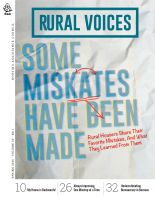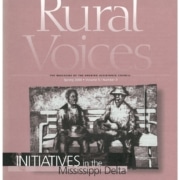Trust AND Verify
 This story appears in the 2015 Spring Edition of Rural Voices
This story appears in the 2015 Spring Edition of Rural Voices
A seemingly small oversight can become a big problem quickly
by Wilbur Cave
We recently found ourselves in a very awkward position because we failed to verify the household income of a family wanting to continue to rent a property that we purchased using HOME funding. Normally, household income is one of the very first things done to determine eligibility for U.S. Department of Housing and Urban Development (HUD) HOME-funded projects. For some unexplained reason, the income was not verified, but a commitment was made to the family to continue renting the property after it was acquired and rehabbed. The family has been renting the property for 14 years prior to our purchase and rehab.
So how did this situation evolve? The family came to Allendale County ALIVE, Inc. seeking housing counseling because the landlord indicated that the property was going to be put up for sale. Having lived in the house for more than a decade, the family did not want to move because they had become attached to the house and the neighborhood. When the family approached us about housing counseling, we were looking for a property to acquire and rehab. The family knew that they needed some time before they could purchase the property and was concerned that the house might be sold while they were preparing for purchase. We were seeking a property to purchase if it could be acquired and rehabbed within our $35,000 limit. The family encouraged us to contact the owner to see if something could be worked out. We contacted the owner and he agreed to sell the house at a price that would work within our HOME limit. In the excitement of trying to ensure that the family could continue to live in the property that they had lived in many years, we forgot to verify their income.
The failure to verify income became evident when the rehab was completed and we had to qualify the family and, of course, they were over the household income limit. Although legally, we could require them to move, we felt an obligation to work with them to find a compatible rental property since it was our fault that we didn’t conduct the proper verification prior to committing to continuing to rent the house to them.
For those who wonder how it is that we were able to acquire and rehab a property for $35,000, the answer lies in the fact that Allendale County, SC has the 10th highest rate of poverty among all counties in the United States. Along with the many negative factors that are often present with a high rate of poverty, low property value is also common. Even with low property values in our community, the supply of homes that can be acquired and rehabbed at the HOME limits are few and far between. Nevertheless, we have been fortunate to find properties.
How did we resolve our problem? We decided that we had to find a compatible property for the family to rent. But this was going to be difficult because there was nothing available at that moment. However, a short time later, we identified four properties that the owner would be willing to work with ALIVE to acquire. One of the four properties was just the right size to accommodate the family, and the house was located in a nice neighborhood. The house needed a minimum amount of work to be move-in ready andthat is rural and has a high rate of poverty.
Had it not been for the availability of the property at the right time and the willingness of the owner to work with ALIVE, we would be in a difficult situation, and would have likely had to return the $35,000 back to the Participating Jurisdiction. Little things can trip you up and cause significant problems that can be very difficult to solve. We are thankful that we prevented an ugly circumstance, not to mention the possible damage that could have been done to our organization’s reputation that has taken 16 years to cultivate and develop.
Wilbur Cave is the Executive Director of Allendale County Alive in Allendale, SC.

